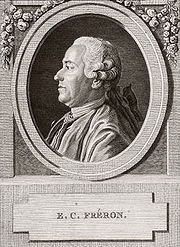
Élie Catherine Fréron
Encyclopedia

France
The French Republic , The French Republic , The French Republic , (commonly known as France , is a unitary semi-presidential republic in Western Europe with several overseas territories and islands located on other continents and in the Indian, Pacific, and Atlantic oceans. Metropolitan France...
critic
Critic
A critic is anyone who expresses a value judgement. Informally, criticism is a common aspect of all human expression and need not necessarily imply skilled or accurate expressions of judgement. Critical judgements, good or bad, may be positive , negative , or balanced...
and controversialist whose career focused on countering the influence of the philosophes of the French Enlightenment
Age of Enlightenment
The Age of Enlightenment was an elite cultural movement of intellectuals in 18th century Europe that sought to mobilize the power of reason in order to reform society and advance knowledge. It promoted intellectual interchange and opposed intolerance and abuses in church and state...
, partly thorough his vehicle, the Année littéraire. Thus Fréron, in recruiting young writers to counter the literary Establishment became central to the movement now called the Counter-Enlightenment
Counter-Enlightenment
"Counter-Enlightenment" is a term used to refer to a movement that arose in the late-18th and early-19th centuries in opposition to the 18th century Enlightenment...
.
He was born at Quimper in Brittany
Brittany
Brittany is a cultural and administrative region in the north-west of France. Previously a kingdom and then a duchy, Brittany was united to the Kingdom of France in 1532 as a province. Brittany has also been referred to as Less, Lesser or Little Britain...
and educated by the Jesuits. He made such rapid academic progress that he was appointed professor at the college of Louis-le-Grand before he turned twenty. He became a contributor to the Observations sur les écrits modernes of the abbé Guyot Desfontaines. The very fact of his collaboration with Desfontaines, one of Voltaire
Voltaire
François-Marie Arouet , better known by the pen name Voltaire , was a French Enlightenment writer, historian and philosopher famous for his wit and for his advocacy of civil liberties, including freedom of religion, free trade and separation of church and state...
's bitterest enemies, was sufficient to arouse the latter's hostility, and although Fréron had begun his career as one of his admirers, his attitude towards Voltaire soon changed.
Fréron in 1746 founded a similar journal of his own, entitled Lettres de la Comtesse de ... It was suppressed in 1749, but he immediately replaced it by Lettres sur quelques écrits de ce temps, which, with the exception of a short suspension in 1752, on account of an attack on the character of Voltaire, was continued till 1754, when it was succeeded by the more ambitious Année littéraire. His death at Paris in 1776 is said to have been hastened by the temporary suppression of this journal.
Fréron is now remembered solely for his attacks on Voltaire and the Encyclopaedists, and for the retaliation from Voltaire, who, besides attacking Fréron in epigram
Epigram
An epigram is a brief, interesting, usually memorable and sometimes surprising statement. Derived from the epigramma "inscription" from ἐπιγράφειν epigraphein "to write on inscribe", this literary device has been employed for over two millennia....
s, and even incidentally in some of his tragedies, directed against him a virulent satire
Satire
Satire is primarily a literary genre or form, although in practice it can also be found in the graphic and performing arts. In satire, vices, follies, abuses, and shortcomings are held up to ridicule, ideally with the intent of shaming individuals, and society itself, into improvement...
, Le Pauvre diable, and made him the principal personage in a comedy L'Ecossaise, in which the journal of Fréron is designated L'Âne littéraire, "the Literary Ass". Fréron is also mentioned in Voltaire's famous novel Candide
Candide
Candide, ou l'Optimisme is a French satire first published in 1759 by Voltaire, a philosopher of the Age of Enlightenment. The novella has been widely translated, with English versions titled Candide: or, All for the Best ; Candide: or, The Optimist ; and Candide: or, Optimism...
, in reference to a rude critic the titular character meets at a theater. A further attack on Fréron entitled Anecdotes sur Fréron ... (1760), published anonymously, is generally attributed to Voltaire.
Fréron was the author of an Ode sur la bataille de Fontenoy
Battle of Fontenoy
The Battle of Fontenoy, 11 May 1745, was a major engagement of the War of the Austrian Succession, fought between the forces of the Pragmatic Allies – comprising mainly Dutch, British, and Hanoverian troops under the nominal command of the Duke of Cumberland – and a French army under Maurice de...
(1745) Histoire de Marie Stuart (1742, 2 vols.); and Histoire de l'empire d'Allemagne (1771, 8 vols.).

